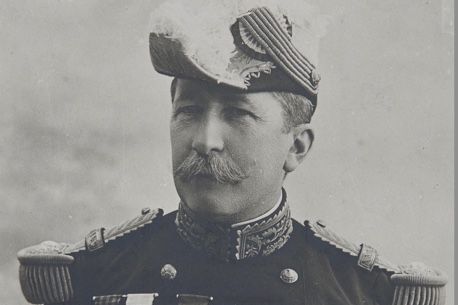
Georges Picquart was a French military officer who overcame his own bigotry to exonerate Alfred Dreyfus, a Jewish army captain unfairly convicted of treason in 1894.
Dreyfus was the only Jewish officer in the French army, and when the military discovered there was a German spy in the ranks, suspicion fell on Dreyfus. The evidence was a crumpled letter found in the trash with handwriting that supposedly matched that of Capt. Dreyfus.
Picquart, like many Europeans of the time, had no fondness for Jews. Earlier in his career he had been a military professor, and young Alfred Dreyfus was one of his pupils. When military investigators asked Picquart for a sample of Dreyfus’ handwriting from his student days, Picquart eagerly complied. Dreyfus, protesting his innocence, was courtmartialed and, in a secret trial, found guilty and sentenced to life imprisonment;
Dreyfus was publicly humiliated on January 5, 1894 by having his military sword broken and the insignia of his rank torn from his uniform, in front of a raging mob of 20,000 shouting “Kill the Jew!” Picquart’s take on the ghastly event? “He’s a Jew, don’t forget that. He’s thinking of the weight of the gold braid and how much it’s worth.”
Dreyfus was immediately transferred to Devil’s Island, where he was kept in isolation for the next five years with no human interaction. Meanwhile, Picquart’s star was on the rise. At age 40, he was made the youngest colonel in the French Army, and assigned to an intelligence unit. In his new position, Picquart had access to classified documents that showed that Dreyfus was framed. The note “in Dreyfus’ handwriting” had been fabricated, and without that note, the entire case fell apart.
Picquart immediately told French military leaders about the evidence he’d found that Dreyfus was innocent, and he was shocked at their reaction. Gen. Charles-Arthur Gonse, head of military intelligence, said to him, “What does it matter to you if one Jew stays on Devil’s Island?” Picquart responded, “Because he’s innocent!” He made it his mission to get Dreyfus exonerated, and paid a high price for it. In 1897 he was relieved of his duties and transferred to a dangerous posting in the southern Sahara. Even in exile, Picquart advocated for Dreyfus, writing letters to political and cultural leaders urging them to speak out against this miscarriage of justice. Most of Picquart’s letters were ignored, but not the one he sent to Emile Zola, the most famous and respected French writer of the time. Zola was so disturbed by what happened to Dreyfus, enabled by the military and political class, that he published his now-famous expose, with the dramatic headline, “J’Accuse..!”
For his troubles, Picquart was punished by being kicked out of the army, framed as a forger, and sent to prison, where he languished in solitary confinement for over a year. Meanwhile, due to rising public pressure, the military brought Dreyfus back to France for a re-trial – but he was convicted again.
Finally, in 1906, Dreyfus’ conviction was overturned and both he and Picquart were restored to their military positions. Newspaper owner Georges Clemenceau, who published “J’Accuse..!” said that “Dreyfus was the victim, but Picquart was the hero.”
For pursuing justice at great cost to himself, we honor Georges Picquart at this week’s Thursday Hero.
Get the best of Accidental Talmudist in your inbox: sign up for our monthly newsletter.